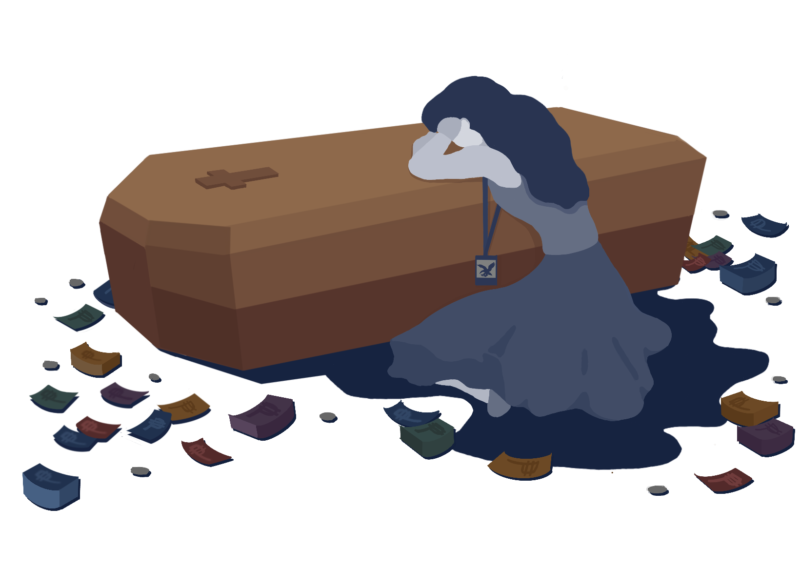Just like most freshmen, Ian* had difficulty adjusting to college life. He was failing Math; writing English papers was the last thing on his mind.
“I needed to concentrate on passing so I had no time to make my English papers,” he says. With these concerns in mind, Ian resorted to having his papers written by his fellow students for a price.
Now an incoming senior, he continues to have his papers done by “paper-makers.” With so much to do and so little time, he does not hesitate when buying papers anymore.
Just like Ian, a growing number of students buy their way into an A by having their papers written for them.
The black market
Looking for someone who could help him was not too difficult for Ian. “The girlfriend of my bestfriend [sic] knew someone who made papers for other people so I got her to contact the person for me,” he says.
Meanwhile, Josh*, one of the few paper-makers who people like Ian could rely on, started writing for other students during his sophomore year and has been doing it ever since. Unlike most of his classmates, he was able to take English electives because of his lighter workload. This led him to help his more stressed classmates write their papers.
“They ended up paying me for my trouble and I’ve been doing it ever since,” he says.
Josh says that the paper-making community is small. In this business, not only should the paper-maker have the time, but the skills and the talent to write academic papers.
According to him, however, students who have their papers done are expected to conduct their own research on the topic to be written. Ian also underwent the same procedure when he did research on his paper before the paper-maker started writing it.
Besides this, the student-customer is also expected to do research on their professors. “They have to learn the particular [professor’s] style, or how much their [professor] knows their writing style,” Josh says.
“After that, it’s just a matter of writing the paper or the thesis.”
The cost of having a paper made depends on the paper-maker. In Ian’s case, he had to pay about P3,000 with discount.
Josh, on the other hand, charges fees depending on how long the paper should be. He usually charges P500 for short papers, P1,000 to P1,500 for papers with five to 10 pages and a considerably larger sum for theses.
No time at all
Poor time management skills are what led Ian to have his papers made. He also adds that there are subjects that need to be prioritized more than the papers he should have been writing.
“It [really] depends on my schedule,” he says. “If I need to do it [have my papers made by another person] again, I will.”
Although at first, Josh saw paper-making as a way of making extra cash, he continued his venture because he saw it as a way of serving his fellow students.
“A lot of my customers aren’t your typical slacker [sic],” says Josh. “A majority of them are just regular students who are just too busy with other subjects or who are experiencing difficulties.”
‘Lack of self-respect’
“In the case of asking somebody to write the paper for you, that’s plagiarism,” History Department Instructor Jose Ma. Edito Tirol says. He also adds that it is the students’ lack of self-respect, as well as respect for the actual author of the paper.
Also, buying one’s paper may mean missing a part of one’s Ateneo experience. “If you’re just going to plagiarize your butt through it [your entire stay in college],” Tirol says. “You’re missing out on the…complete experience, which is education.”
“That ability to study is something that carries outside, beyond campus, beyond university, for
the rest of your life.”
He also believes that writing your paper without crediting your sources is the same as having someone else do your paper. What makes the paper-making worse is the money that the student-customer has to pay in having that paper made.
“The guy [paper-maker] is a prostitute,” Tirol says. “[He] is pimping, prostituting his talents voluntarily.”
Calling for papers
Tirol also believes that websites like Calling for Papers, or CAP (http://callingforpapers.com), is as illegal as plagiarism itself. He shares that Filipinos have paper-making businesses similar to CAP. When the Americans, their usual customers, contact them, the Filipinos sell their papers to their customers. The Americans then pass on these papers to a particular American high school or college.
“Now, I wouldn’t be surprised if some students on campus do the same thing.”
CAP is a website where students could upload and share their academic papers, whether written in the past or just recently. With its tagline —“Whatever happened to your A papers last sem?”— CAP only accepts papers from students who study in the University of the Philippines, De La Salle University, and the Ateneo.
Josh believes that websites like CAP are dangerous, as they allow students to copy from other papers, creating a huge possibility of getting caught.
CAP, however, is committed to preventing plagiarism. In its Frequently Asked Questions section,
it cites turnitin.com, a website where teachers may submit students’ papers to check if plagiarism has been committed.
As of press time, CAP’s administrator cannot be reached for comment.
Death to plagiarism
Tirol stresses that stricter policies should be implemented to prevent students from plagiarizing. The school should also raise awareness among the students on what plagiarism is and is not and what the school is doing to prevent it.
Also, as much as possible, Tirol wants the students’ awareness to develop, even beyond their English classrooms.
“If Ateneans end up plagiarizing anyway, no matter what the English teachers tell them, what’s the point?”
Despite the Ateneo’s existing policies on plagiarism, Ian says he is not afraid of getting caught. “I’m not really scared because the chances of me getting caught are slim,” he says.
Meanwhile, Josh confesses that some professors already doubted the papers that his customers submitted. He is confident, however, that they could get themselves out of these kinds of situations.
“In the end, the only defense the client really has is to read the finished product and do the research so that they could argue their way out of it.”
Although he doesn’t see paper-making as a long-term venture, Josh has no plans of stopping. According to him, his customers were pleased with his works because the papers were made as if they wrote them themselves.
“I’m not a miracle worker,” he says. “The paper in itself is a reflection of the performance of the person who hired me.”
“As long as there are people who need me, I’ll keep doing it.”
with a report from Paolo Adrian B. Monteiro
*Names have been changed to protect the individuals.






